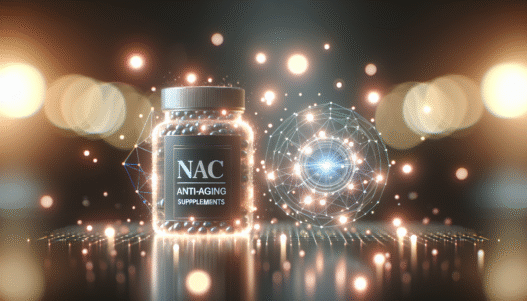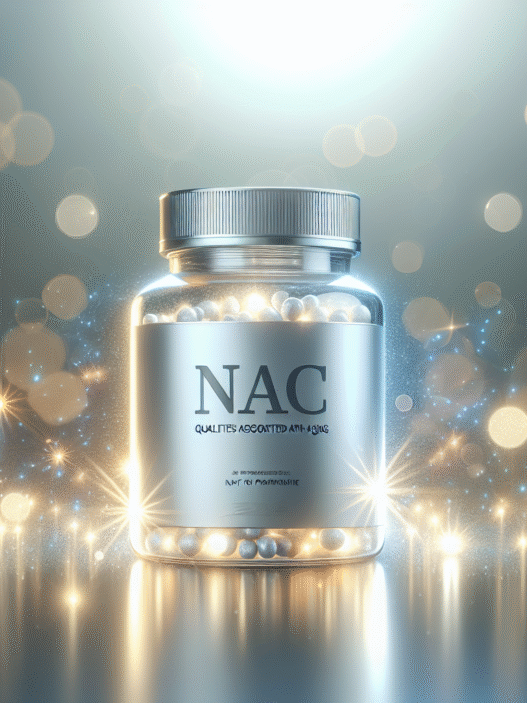Understanding NAC Benefits
Overview of N-Acetyl Cysteine
N-acetylcysteine (NAC) is a supplement known for its diverse health benefits. It has the potential to improve various conditions, including athletic performance, blood sugar levels, and chronic lung issues. NAC is also recognized for supporting liver health and detoxification processes by stimulating the synthesis of glutathione, a powerful antioxidant that helps combat free radicals and reduce oxidative stress (Medical News Today).
NAC is an FDA-approved medication used primarily for treating acetaminophen overdose and as a mucolytic agent for respiratory illnesses. Its powerful properties stem from its ability to enhance intracellular glutathione levels and reduce inflammatory cytokines, which contributes to its antioxidant and anti-inflammatory effects.
| NAC Characteristics | Details |
|---|---|
| Type | Sulfur-containing amino acid |
| Common Uses | Antioxidant, mucolytic, detoxification |
| Antioxidant Capacity | Increases glutathione levels |
| FDA Approval | Yes |
Mechanisms of Action
NAC functions primarily through its role in enhancing glutathione levels within the body. Glutathione is critical for detoxification processes and serves as one of the body’s most important antioxidants. By increasing its levels, NAC helps protect cells from oxidative damage and promotes overall cellular health.
The mechanisms of NAC also include modulating inflammatory responses, which can be beneficial for individuals dealing with chronic inflammatory diseases. By reducing levels of inflammatory cytokines, NAC assists in lowering inflammation, thereby potentially improving various health conditions.
Additionally, NAC’s role as a mucolytic agent enables it to break down mucus, making it easier to clear out from the respiratory system. This mechanism is particularly relevant for those with respiratory conditions, as it helps improve breathing and lung function.
Understanding these mechanisms provides insight into how NAC can be beneficial for detoxification and longevity seekers, making NAC an appealing option for individuals interested in nac anti-aging supplements and overall health improvement.
Health Benefits of NAC
N-Acetyl Cysteine (NAC) offers a range of health benefits that can significantly improve various aspects of well-being. This section will focus on its antioxidant properties, management of lung conditions, and impact on mental health.
Antioxidant Properties
NAC is highly regarded for its role in boosting antioxidant production within the body. It is essential for synthesizing and replenishing glutathione, one of the body’s most vital antioxidants. This antioxidant plays a significant role in neutralizing free radicals, which can contribute to cellular damage and aging. According to Healthline, an increase in antioxidant intake, such as that from NAC, may help lower the risk of chronic conditions, including cardiovascular diseases.
The table below summarizes the key antioxidant effects of NAC:
| Benefit | Description |
|---|---|
| Reduces Free Radicals | Helps neutralize harmful free radicals that contribute to oxidative stress. |
| Supports Glutathione | Essential for the production and replenishment of glutathione in the body. |
| Lowers Disease Risk | May decrease the risk of chronic conditions, such as heart disease. |
For additional information on NAC’s antioxidant benefits, visit our page on nac antioxidant properties.
Management of Lung Conditions
NAC serves as both an antioxidant and an expectorant, making it beneficial for individuals with respiratory conditions. It assists in relieving symptoms related to lung diseases by replenishing glutathione levels in the lungs, which helps reduce inflammation in bronchial tubes and lung tissue. Studies suggest that NAC supplementation can improve symptoms, decrease exacerbations, and help manage lung decline in conditions such as chronic obstructive pulmonary disease (COPD) and chronic bronchitis.
The following table outlines NAC’s impact on respiratory health:
| Condition | NAC Effectiveness |
|---|---|
| COPD | Reduces symptoms and exacerbations |
| Chronic Bronchitis | Improves lung function and reduces inflammation |
Impact on Mental Health
NAC demonstrates potential benefits for mental health by regulating glutamate levels in the brain. This regulation has implications for several mental health conditions, including bipolar disorder, schizophrenia, obsessive-compulsive disorder (OCD), and substance use disorders. Research indicates that NAC may help alleviate symptoms of depression and OCD, and may even mitigate certain side effects of schizophrenia.
Additionally, NAC is thought to enhance brain health by promoting the health of neurons and reducing oxidative damage associated with aging. This makes it a valuable supplement for those concerned about age-related cognitive decline, with potential applications for conditions like Alzheimer’s and Parkinson’s diseases.
| Mental Health Condition | NAC Benefits |
|---|---|
| Bipolar Disorder | Reduces symptoms and mood fluctuation |
| Schizophrenia | Minimizes side effects and aids in symptom management |
| Obsessive-Compulsive Disorder | Decreases the severity of compulsive behaviors |
For further details on NAC’s impact on mental health, explore our article on nac supplement benefits.
Overall, NAC’s multifaceted benefits encompass antioxidant properties, respiratory health support, and mental health improvement, making it a valuable addition to health regimens focused on detoxification and longevity.
NAC for Specific Health Conditions
N-Acetyl Cysteine (NAC) proves beneficial for various health conditions, making it a valuable supplement for individuals focused on longevity and detoxification. Below are specific areas where NAC has shown positive effects.
Diabetes and Insulin Sensitivity
Research indicates that NAC intake can improve insulin resistance and secretion in obese adults. A study found that participants taking NAC showed better insulin management compared to those on a placebo after adjusting for various health factors, including vitamins and dietary fiber. Improved insulin sensitivity is crucial for blood sugar management, making NAC a potential ally for those at risk of type 2 diabetes.
Respiratory Health
NAC enhances respiratory health by acting as a mucolytic agent, which means it helps in breaking down mucus in the airways. This aspect makes it useful for individuals suffering from chronic lung issues. NAC can also stimulate the production of glutathione, an important antioxidant in the lungs. This not only fights oxidative stress but may also support overall lung function. NAC’s role in managing chronic lung conditions aligns with its properties of reducing inflammation and improving overall lung function.
Liver and Kidney Function
NAC is widely recognized for its potential to improve liver and kidney function. This supplement aids in the breakdown of toxins and drugs, which is particularly beneficial for individuals with liver or kidney diseases. NAC-based drugs are even utilized in clinical settings to treat acetaminophen overdose, enhancing glutathione levels and helping to prevent liver damage when administered timely. Its detoxifying effects are beneficial for overall health and longevity, making NAC a compelling option for those concerned about liver health or detoxification.
| Health Condition | NAC Benefits |
|---|---|
| Diabetes | Improves insulin resistance and secretion |
| Respiratory Health | Acts as a mucolytic agent; stimulates glutathione production |
| Liver and Kidney | Aids in breaking down toxins; beneficial for liver/kidney health |
The diverse applications of NAC highlight its importance in an anti-aging regimen. For more on how NAC may support overall health, see our article on n-acetyl cysteine benefits and its effects on skin and aging, referenced in nac supplement benefits.
Research and Clinical Trials
Research into the efficacy of N-Acetyl Cysteine (NAC) has gained traction in recent years, revealing promising results across various health applications. Investigating these studies sheds light on how NAC may serve as an effective supplement, particularly for individuals concerned about aging and health.
Studies on NAC Efficacy
Numerous studies have explored the benefits of NAC. One notable research trial focused on the combined supplementation of Glycine and N-Acetylcysteine (GlyNAC) in older adults. This randomized clinical trial demonstrated improvements in glutathione deficiency, oxidative stress, and mitochondrial dysfunction, as well as enhancements in physical function and other aging hallmarks.
Further trials highlight NAC’s potential in managing chronic conditions. A study involving participants with chronic renal insufficiency undergoing cardiac surgery found that NAC administration may help prevent acute kidney injury (American Heart Journal). Additionally, a randomized controlled trial indicated that NAC could reverse cognitive decline in elderly individuals, showcasing its potential impact on mental health.
Potential Applications in Chronic Diseases
Beyond these findings, NAC demonstrates potential applications for various chronic diseases. For instance, a recent study assessed NAC’s effects on metabolic disorders among obese adults. The results revealed that NAC significantly reduced senescence activity, marked by lower SA-β-gal activity and decreased expression of p16 and IL-6 genes in visceral adipose tissue. This suggests a promising role for NAC in addressing metabolic health and associated complications.
Moreover, NAC’s reputation as a powerful antioxidant positions it as a candidate for combating oxidative stress, a contributor to many chronic conditions. By potentially stimulating the synthesis of glutathione, NAC assists in neutralizing free radicals, thereby promoting overall health and longevity.
These studies collectively support the notion that NAC may serve as an effective supplement, particularly for those interested in nac anti-aging supplements and exploring options for improving vitality and managing health conditions. For additional information about NAC’s benefits, view our guide on n-acetyl cysteine benefits.
Safety and Administration of NAC
Different Administration Methods
N-Acetyl Cysteine (NAC) can be administered through various routes, including oral, intravenous, or inhalation methods. Each method offers unique benefits and is suited to different situations.
| Administration Method | Description | Common Uses |
|---|---|---|
| Oral | Taken by mouth in capsule or powder form. | Daily supplementation, antioxidant support. |
| Intravenous | Directly infused into the bloodstream. | Treatment of paracetamol overdose, rapid delivery of high NAC concentrations. |
| Inhalation | Delivered through a nebulizer or inhalation device. | Treatment of respiratory diseases; has shown a good safety profile. |
NAC is generally safe and well-tolerated even at high doses. Intravenous administration is often utilized in emergency settings for conditions such as acute paracetamol overdose (NCBI).
Bioavailability and Pharmacokinetics
The bioavailability of NAC, particularly when taken orally, is low, typically less than 10%. This means that only a small fraction of the NAC actually reaches plasma and tissues. The pharmacokinetics of NAC are still not completely understood, and it can be oxidized into a disulfide form within the body.
The terminal half-life of NAC varies based on the method of administration:
| Administration Method | Terminal Half-Life (hours) |
|---|---|
| Oral | 5.58 – 6.25 |
| Intravenous | Varies |
The volume of distribution (Vd) of total NAC ranges from 0.33 to 0.47 L/kg.
Adverse Effects and Risks
While NAC is largely considered safe, it can have adverse effects that range from mild to severe. Gastrointestinal symptoms are common, affecting up to 23% of users. The method of administration may influence the frequency and severity of side effects.
Intravenous administration of NAC may lead to more adverse effects compared to oral use. Serious reactions, such as anaphylactoid reactions, are uncommon but can occur. For inhaled NAC used in respiratory conditions, the safety profile has been found to be satisfactory.
NAC may also interact with various medications, affecting their effectiveness. Some potential interactions include those with drugs used for malaria, high blood pressure, and blood clotting disorders. It is advisable to consult with a healthcare provider before starting NAC, especially if there are existing health conditions or ongoing treatments. Additionally, concurrent use of activated charcoal and NAC for poisoning scenarios may reduce the efficacy of either substance (WebMD).





















